
Atlas F1 GP Editor
In a season that has so far seen one driver win every race bar one, Jarno Trulli's maiden win at Monaco only two months ago seems like a lifetime away - its memory faded even more by an error in the French Grand Prix and a violent accident at the British Grand Prix. Still, Trulli remains the most improved driver of the season - with a clear resurgence in his performance over the past 12 months - and the Italian is now one of the central names in the anticipated 2005 line-up reshuffle. Atlas F1's David Cameron spoke to the people closest to Trulli and offers a rare look at a talented and complex Grand Prix driver
"Well there are many options, but first of all what Jarno prefers and wants is to understand better the situation at Renault, because after three years he formed a good relationship with the people - and when this relationship is getting stronger and stronger then of course you want to stay there and continue in this direction. I think what Michael Schumacher shows to everybody is that a long period in your job can pay in the end, because this year for Michael in Ferrari is the ninth season, and if there's anyone to learn from in F1, it's Michael Schumacher.
"And maybe you can change, but you have to rebuild a situation, a group of people, and it's not easy in Formula One because now to have a result is teamwork – you can be a good driver, but if your engineer is not able to set the car up like you want and understand how you prefer the set up of the car then it is not easy, or if your strategy is not correct, you can have the best car and can be the better driver but you won't win. It's so complicated, and it's the job of eighty people to have a result on the track.
"But for sure if somebody (else) is interested in you it's good; it will help if you know you have another opportunity. But it is very difficult to understand how the situation is in some other team, because from the outside everything can look fantastic, but maybe from the inside the situation is not so nice."
Current speculation has Giancarlo Fisichella returning to Renault as a part of a deal which has Mark Webber (a current alumni of FB Management) moving over to Williams rather than to Renault, which currently holds his contract and loans the Australian to Jaguar. The irony of that deal is that Trulli replaced Fisichella at Renault when the latter fell out of contract with both Renault (then named Benetton) and FB management, and the Australian was the team's test driver when Fisichella drove there. Formula One has a small gene pool.
If this short memory leads to Trulli echoing Fisichella's Renault/Briatore contract negotiations, if it has people considering the two drivers as interchangeable - as Briatore famously did last time the drivers swapped teams - then they might want to remember which of the two claimed a win from pole and against a full grid rather than because of the weather and an early end to the race.
Briatore has famously guided Trulli's career through the potential minefield of the Formula One paddock, but as the driver's personal manager, Cavuto is responsible for putting his charge into a position where Briatore would notice his abilities in the first place, so as to take an interest in his career.
Having both grown up in the seaside Italian resort town of Pescara, the two met and became friends at the local karting track, sharing a love of the sport they both competed in. Cavuto saw the obvious talent the younger boy had and pushed him forward in the sport, eventually taking on a managerial role and guiding him through to a number of World Championships in karting before taking the German Formula 3 Championship in 1996, and then starting a long Formula One career the next year with Minardi.
"I don't think Jarno has changed really," Cavuto notes as he sits back to enjoy the bright sunlight outside the Renault garage, "but for sure when you have a good result you have much more confidence in yourself, and you have the payback from your job. And for this reason things go better, in an easier way, but to say he is a different guy or a different driver, I don't think so.
Cavuto has seen Trulli win many, many races, but there was quite a gap between the last two. It's a reflection of just how difficult it is to get results in the premier stage in motorsport. "You arrive in Formula One, and in your career you have won everything so you know that your role is to win. Then you start Formula One and already in the first year, at the fourteenth Grand Prix, you are able to score a great result but unfortunately because of a broken engine your result is gone.
"After that you have two years with a car at Prost Grand Prix, and everyone can remember what Prost Grand Prix was in the end, before we went to Jordan, which was a very good team. But as he arrived the staff had started to leave, and the performance went down, down, down race by race; the car was not reliable, so you have two more years with this problem, and that is four. After that we joined with Renault, but Renault in the first year was not fantastic, so it is five, and after five years you have no result, no payback from your job!
"I think what I can see from the better side of Jarno is that maybe another driver could be destroyed by these things that happened. But he was able, every time, to take inside himself the power and the spirit to continue, and to be stronger." Trulli is Abruzzo, and they have a reputation for being different to most Italians – very stubborn and bull headed. "Exactly - we say that Abruzzo is forte e gentile; forte means strong and gentile means somebody who is kind, gentle with you.
"And I can recognise both qualities in Jarno."
Trulli has always had a reputation as being fast but unlucky, and he has been stopped 33 times by problems with his car – more that one in four of his races have been stopped by a problem that was out of his control – not to mention the number where he has been slowed by problems but managed to bring the car home. This bad luck has to have an affect on a driver, surely?
"To be honest, Jarno doesn't particularly believe in luck - he is not a type of driver who jumps in the car from the same side or anything - but when these things happen in the end you start to think that maybe there is something against you!" Cavuto laughs. "In this situation maybe I was much more superstitious than him, so when people before the race sometimes say to me 'good luck' I would say 'oh shit, why do you say to me that!'
Last year, Renault's executive director of engineering Pat Symonds told Atlas F1: "before I worked with Jarno I used to get on at people who spoke about luck, because I'm just not a believer in it - you make your own luck. Someone once said luck comes with practice, and I think that's true. But I have to admit that since I've known Jarno I've actually been wondering if I should change my mind!"
One year on, and the veteran engineer is reflecting on the change in his lead driver. "What I think with someone like Jarno, I said to you last year I don't believe in luck – I still don't believe in luck, and I haven't won the lottery, have I! I'm an engineer, I'm a scientist, I'm analytical, and luck doesn't fit in to that sort of lifestyle. Certainly these days, with the sophistication of cars, if a driver is having reliability problems it's very unlikely that it's going to be the driver."
If there is anybody who knows about Trulli's reliability problems it's Fabrice Lom. The cheery Frenchman has been Trulli's engine engineer since the driver started with Renault three years ago, a part of the team that has been built around him since he started wearing light blue on race day. "He has this image, sure," Lom acknowledges, "but for me last year, for example he had only one failure, and it was not a failure of an engine, so you see what I mean? You concentrate on his bad luck, but he was luckier than Fernando last year."
Lom has a point, albeit it with the wrong numbers – Trulli was stopped twice by being punted off track, and once each by fuel pump, engine and hydraulic problems, whereas Alonso suffered four engine problems and one gearbox failure. Unfortunately though, Trulli was in a strong position when he was knocked off both times, and he was very unlucky with the later qualifying sessions in the year, where he took the last three Friday poles but was unable to convert them on Saturday for a number of reasons, once because of car problems, once because of the weather, and once because of driver error.
The ability to finish races has allowed Trulli to gain more experience and, crucially, work on his feedback with his engineers in a more efficient manner. Lom says that Trulli's technical feedback has certainly changed over the three years they've worked together. "He was different when he arrived," the Frenchman comments. In technical terms, he came from Jordan - where there was a lot less engineering on the car - and we brought him a lot of engineering, a lot of knowledge, and there are also a lot of people who are able to take the data.
"So, for example, he arrived when we had an automatic gearbox, and in Jordan it was not the case, so he was a little bit reluctant to do it in the beginning, but then he saw that it was good to use these things. He arrived with a personality of a guy who was happy to have a huge role in the set up of the car, the gears and everything, which is unfortunately less the case in a big team like Renault because you have to rely a lot on people who are specialists in each sector. So he changed his way to work with this, and now he knows that a lot of people are here to help him, and he relies on them."
Symonds agrees that the changes in Trulli's technical abilities have been for the better over the years. "When it was announced that he was coming to us we had a fairly open meeting with the engineers who were going to be involved with him, as well as the other engineers from the other cars, and at the end of it I said one thing: I think you have to watch it with Jarno, he has quite a closed mind, that he's not very accepting of new ideas.
"I think part of that might be that at Jordan the driver had to play a slightly bigger part in the engineering than he does in our team – of course they play a very important part in our team, but they have so much support, so much back up, specialists in each area looking at things – and I think as time came to pass and he came to drive for us in that first year I was proven to be right, but to his credit he's very open minded now, and he has a lot of trust in the people he has working on his car, and in the team in general."
Alan Permane and Nick Chester are the major recipients of that trust. Race engineer and chassis engineer respectively for Trulli for the last three years, the two Englishmen have built a closeness that allows them to finish each other's sentences, a closeness that only comes from spending almost every waking moment together towards a common goal. That goal is the continued progression of Jarno Trulli up the competition ladder, and having already scored far more points than he has ever scored in any other year suggests that they are achieving it.
"I mean it's not an overnight thing, it doesn't suddenly go 'oh right, we can do it now' - it evolves. He's quite relaxed now, he doesn't let any outside influences seem to bother him at all, what the press is saying, what is going on – he just sort of gets on, shuts it all out, and gets on with things."
"Yeah," Chester continues, "through last year, not all of the races went very well for us, and over the winter I think he worked hard, he was very positive about testing, and he came into the season expecting he was going to do well and had a really confident attitude, and from the start of the season it went really well."
"I mean, we've definitely seen a difference in him this year," Permane picks up the topic, "especially since Barcelona - since he got onto the podium in Barcelona his confidence just went like that (pushes his hand steeply upwards). In Monaco, from first practice on, we definitely felt we could win it, didn't we?"
"Oh yeah," Chester agrees, "he knew going there that he was going to be very quick, and he was very relaxed and confident all weekend."
"Exactly," concludes Permane, "and it almost seemed that he had no doubt, from qualifying onwards. Certainly Saturday afternoon, Sunday morning he was very relaxed and said 'I'm going to win', and had that confidence then. And since then he hasn't really changed."
So the win hasn't changed Trulli – the change came before, and it resulted in the win. But what caused this change in the driver? "Maybe us shouting at him a lot!" Permane laughs. "And Nick does a lot of work, post race analysis stuff, which we've been showing him a lot more of this year, showing him exactly where he has been slow in races and where he needs to improve. Because there is no doubt that he has struggled in races in the past, and no doubt he has improved this year, and we'd like to think some of it is down to just plowing through data and showing him where he can improve."
"Which corners, and which part of the race, how he's handled traffic and all that" Chester adds.
"And yeah, I think some of it comes from just another year and a bit more trust and that sort of thing," adds Permane, "and he seems a bit more happy, if we say something like 'let's try this', he always goes into it with an open mind and things like that – he doesn't go into it with prejudices like some drivers would do. I'd like to think he trusts us, doesn't he, to do things?"
"Yeah," Chester concludes, "it takes quite a while to get that sort of relationship going, and it's pretty good at the moment."
"And therefore winning your first race does make much more of a difference to someone like that than someone who is naturally full of self confidence and kind of outgoing. The interesting thing with Jarno, and probably something that I haven't seen before, is that I think he almost made more of a step when Fernando won his first race than when he won his own first race.
"Jarno was going through quite a hard time up until the middle of last year, and in August Fernando won in Hungary. That can be pretty hard on a teammate – the first win for a while and you didn't get it, your teammate did – and I think it shows the immense strength of character of Jarno that, although I didn't realise it at the time and only noticed it when I looked back, it was a turning point for him and I think he raised his game considerably.
"He particularly worked on his race craft – he's always been quick, there's never been any doubt about that, but he particularly thought about his racing and I think I've seen a big improvement in him since then, which has almost culminated in his win in Monaco. Now of course a win in Monaco can do little else but boost his self esteem, it can only enhance it, but what happened with Jarno is not something I've ever seen before, and I think it's an immense tribute to his character.
"If you look at Jarno's season he was very strong at the end of last year – he had the Friday pole for the last three races, he had a cracking race in Suzuka where it rained, so he started from the back, but he just drove through the field – it polished his race craft, and I think as he saw that he could do better and better in races he got his self esteem, built it up, built it up, got to Monaco and on Friday, having done the first day of practice and spent a bit longer talking about things than usual, you could see in him that he really thought he was going to win, and it was probably the first time I'd seen that.
"And I got a feeling on Sunday that he was fairly unbeatable."
In a way, then, Trulli's confidence in his ability to win stemmed from his teammate winning. It was an unusual situation for him – throughout his career he had not really been in a car that had the ability to win (which made his first drive in Austria, as well as the front row qualifications in a Mugen powered Jordan, all the more astonishing), but he had comfortably been ahead of his teammates, including such highly rated drivers as Olivier Panis, Heinz Harald Frentzen and Jenson Button.
Suddenly he had to face up to his first teammate not only beating him, but also taking a race win. That Alonso was considerably younger than him, and also a very close friend, made the situation even more complicated.
Lucio Cavuto could see his good friend was struggling, but also that he knew how to turn it all around. "Well first of all you must understand the potential your teammate has, and we knew for a long time that Fernando was a very good driver. And then, even last year, Jarno was faster than Fernando - out of 32 qualifying sessions Jarno was ahead of Fernando 20 times.
"What I think I saw was almost more application," Symonds agrees, "now that's not to say that he didn't have application before, but I think it was almost a little bit misguided – it's quite hard to explain. But what I think he did when Fernando won in Hungary is he looked quite deeply inside himself, and really thought about perhaps things that we'd said that he'd maybe dismissed, looked at them again - and I'm not saying he didn't dismiss some of them again! - but I sort of hope that he also took some of them on board.
"And there's also his self confidence. I think a good example of it is maybe Silverstone last year – Jarno had a great practice session, great qualifying, he's leading a race, pulling away and it all looks good, the safety car comes out and it's like he was slightly getting flustered and losing that self confidence. It's that sort of thing I feel now wouldn't bother him – in fact didn't we see in it Monaco – he lost out twice from the safety car, but he just didn't let it get to him, and that's the sort of thing that I mean, that's a mental attitude."
"For me, I saw more confidence," Lom notes about the period leading up to the race in Monaco, "he knew, and we knew, that he was able to win. There was no problem, he had the speed – he just needed the confidence."
"Yeah, I think he realised that the team was then capable of doing it," Permane acknowledges, thinking back to Hungary, and the start of his driver's comeback. "If you look at the last couple of races of last year, when we came to Indy on Friday he was quickest, in Suzuka on Friday he was quickest, and as Nick said over winter his attitude was just fantastic – his testing was faultless, he did loads of miles, he just put the effort in, and then coming into this season he was prepared.
"So it wasn't the win that changed him, it was him changing that's given him the win if you like - it's that way round. And like I said, from beating Fernando in Barcelona his confidence just shot up, it really shot up."
Perhaps it's the contrary nature of the Abruzzi in him that allowed him to take strength from somebody else's win, but it was his kindness, his ability to work and share with others, that has allowed him to take this strength and forge a win of his own. And it's these characteristics that will continue to push him forward, no matter where he drives next year.
Speculation is a side effect of the tremendous interest Formula One draws from its fans, and never more so than when it comes to the silly season of driver movements. Jarno Trulli is out of contract at the end of the year - with both his team Renault as well as his management, Flavio Briatore's company FB Management - which means that people were always going to speculate on his future.
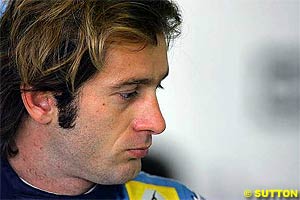 "We are really confident of where he is going to be next year – there are no problems there," Trulli's personal manager Lucio Cavuto says, ignoring the growing speculations that the Italian is going to be replaced in the team that has been his home for the past three years.
"We are really confident of where he is going to be next year – there are no problems there," Trulli's personal manager Lucio Cavuto says, ignoring the growing speculations that the Italian is going to be replaced in the team that has been his home for the past three years.
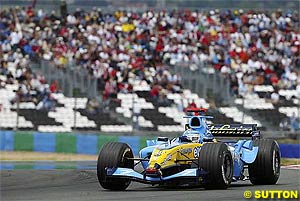 It also has a short memory - the saying goes that in Formula One you are only as good as your last race, and in Trulli's last race his suspension collapsed and led to a horrific looking crash (from which he walked away unharmed), and prior to that he made a mistake in France, allowing Rubens Barrichello to take a podium finish from him on the last lap. This discounts nine successive finishes in the points - one of them the only win this season not claimed by Michael Schumacher - and a current strong fourth in the World Championship standings.
It also has a short memory - the saying goes that in Formula One you are only as good as your last race, and in Trulli's last race his suspension collapsed and led to a horrific looking crash (from which he walked away unharmed), and prior to that he made a mistake in France, allowing Rubens Barrichello to take a podium finish from him on the last lap. This discounts nine successive finishes in the points - one of them the only win this season not claimed by Michael Schumacher - and a current strong fourth in the World Championship standings.
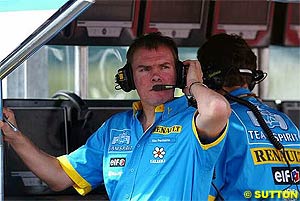 "I mean, look at France - when this happened of course Jarno was very upset, but he was the first to say 'this was my fault', to accept it and move on. He doesn't hide from things like that. If you look at a whole season then of course you will see mistakes - drivers make mistakes at every race - but this was noticeable because of what happened, and when. But Jarno is very strong, and he has already taken this inside himself and learnt from it. I think it will make him better again, and he will learn from it."
"I mean, look at France - when this happened of course Jarno was very upset, but he was the first to say 'this was my fault', to accept it and move on. He doesn't hide from things like that. If you look at a whole season then of course you will see mistakes - drivers make mistakes at every race - but this was noticeable because of what happened, and when. But Jarno is very strong, and he has already taken this inside himself and learnt from it. I think it will make him better again, and he will learn from it."
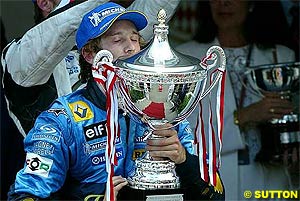 "But I never saw Jarno complain about these things. You know, me and Jarno are very religious, we are Catholic like most Italian people, and so I asked him one time 'Jarno, let's go pray.' Jarno said, 'okay, we can go, because to pray is a nice thing, but I won't ask for nothing for me because I am already a lucky man, and so I don't need the help in Formula One.' I think this was his answer to show, first of all, that he was stronger than me, and second that he had in his head the answer to all the questions."
"But I never saw Jarno complain about these things. You know, me and Jarno are very religious, we are Catholic like most Italian people, and so I asked him one time 'Jarno, let's go pray.' Jarno said, 'okay, we can go, because to pray is a nice thing, but I won't ask for nothing for me because I am already a lucky man, and so I don't need the help in Formula One.' I think this was his answer to show, first of all, that he was stronger than me, and second that he had in his head the answer to all the questions."
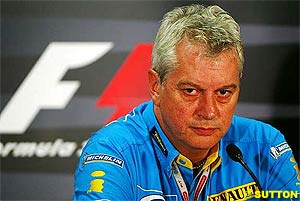 So if we discount luck from the equation, if talk of it no longer has a place in modern Formula One, then what was it that turned Trulli's career around? Cavuto has a theory: "this year, if you look back, Jarno had a streak of nine consecutive race finishes – twice in the end of 2003 and seven times this year – and this has never happened in his career before, not because he was not able to finish the race but because he would have every time a failure on the car! So when you have nine results, people start to say 'ah, Trulli is there'."
So if we discount luck from the equation, if talk of it no longer has a place in modern Formula One, then what was it that turned Trulli's career around? Cavuto has a theory: "this year, if you look back, Jarno had a streak of nine consecutive race finishes – twice in the end of 2003 and seven times this year – and this has never happened in his career before, not because he was not able to finish the race but because he would have every time a failure on the car! So when you have nine results, people start to say 'ah, Trulli is there'."
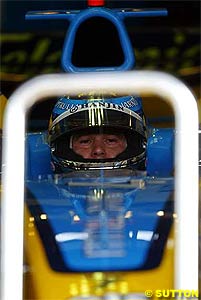 "Yeah, for sure at the start he sort of had very fixed ideas of how he wanted the car and this sort of thing, and the first six months were quite difficult, weren't they?" Permane notes, the ever present Chester at his side agreeing, allowing him to continue, "while he struggled with the car, and we struggled to set it up for him. But as he got to drive, to understand the car, we got to understand how he works.
"Yeah, for sure at the start he sort of had very fixed ideas of how he wanted the car and this sort of thing, and the first six months were quite difficult, weren't they?" Permane notes, the ever present Chester at his side agreeing, allowing him to continue, "while he struggled with the car, and we struggled to set it up for him. But as he got to drive, to understand the car, we got to understand how he works.
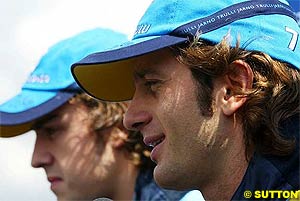 "Well yes, I do see a difference in Jarno now" Symonds notes, lighting another cigarette, taking the moment to consider his point before continuing. "I'm someone who does believe most drivers, having won their first race, take a step up because, you know, a sportsman needs to have supreme self esteem, but occasionally it's a little more outward than inward, and I think Jarno was a guy who didn't have the self esteem that he deserved.
"Well yes, I do see a difference in Jarno now" Symonds notes, lighting another cigarette, taking the moment to consider his point before continuing. "I'm someone who does believe most drivers, having won their first race, take a step up because, you know, a sportsman needs to have supreme self esteem, but occasionally it's a little more outward than inward, and I think Jarno was a guy who didn't have the self esteem that he deserved.
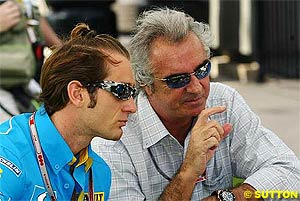 "But the problem was last year Fernando had results and Jarno didn't, for many, many reasons. The important thing for a driver is to understand that if you don't get the result because you haven't got the speed then you can do nothing against that, because you haven't got the speed. But every time Jarno did have the speed, he didn't have the points, he didn't finish the races. So it was just a situation that he had to work and find the solution."
"But the problem was last year Fernando had results and Jarno didn't, for many, many reasons. The important thing for a driver is to understand that if you don't get the result because you haven't got the speed then you can do nothing against that, because you haven't got the speed. But every time Jarno did have the speed, he didn't have the points, he didn't finish the races. So it was just a situation that he had to work and find the solution."
|
Contact the Author Contact the Editor |
Please Contact Us for permission to republish this or any other material from Atlas F1.
|
Volume 10, Issue 29
Articles
Forte e Gentile: Analysing Trulli
Every Other Sunday
2004 German GP Preview
2004 German GP Preview
German GP Facts & Stats
Columns
The F1 Trivia Quiz
Bookworm Critique
On the Road
Elsewhere in Racing
The Weekly Grapevine
> Homepage |